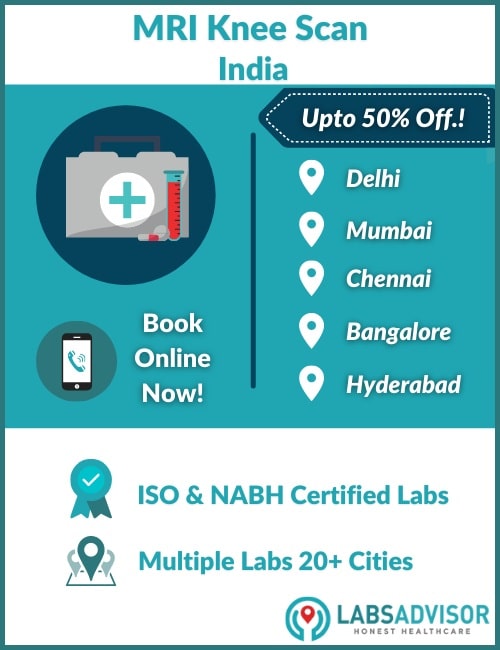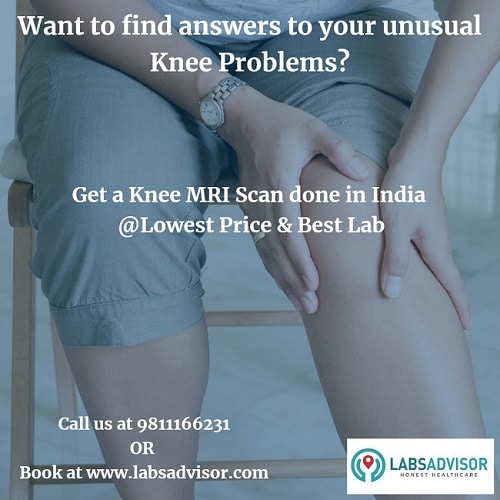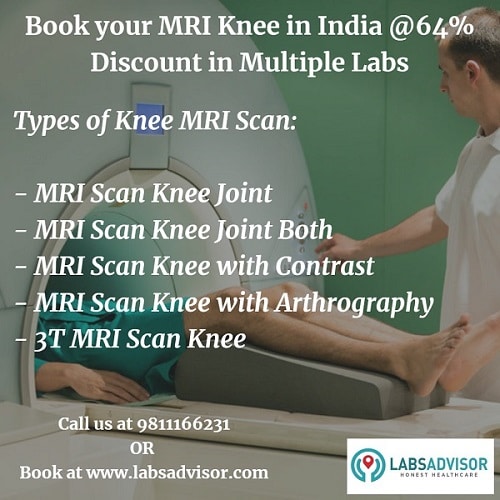
MRI Scan Knee is done to study the different parts of a knee such as bones, cartilages, tendons, muscles, ligaments, and blood vessels. To figure out where exactly the injuries are and if the knee needs to undergo surgery, an MRI of the knee is done.
Book your MRI knee scan near you at your local top-quality labs through us at up to 50% discount. The lowest MRI of Knee cost in India is ₹2250 only.
MRI Knee Scan in India Through LabsAdvisor
|
Knee MRI Cost and Lab Details
Here is the list of the Knee MRI scan cost in India offered by 70+ labs.
Note that the MRI Knee cost mentioned may vary from the actual price. Click on the link to know the updated prices and lab details.
| Find Knee MRI Labs & Book Appointment | Price starting from |
| MRI Knee Joint Price in India | ₹2250 |
| MRI Knee Joint Both Price in India | ₹4500 |
| MRI Knee Joint with Contrast Price in India | ₹4000 |
| MRI Knee Joint Both with Contrast Price in India | ₹6850 |
| MRI Knee with Arthrography Price in India | ₹5780 |

Frequently Asked Questions About Knee MRI
What is an MRI Knee Scan?
MRI Scan Knee is done to study the different parts of a knee such as bones, cartilages, tendons, muscles, ligaments, and blood vessels. To figure out where exactly the injuries are and if the knee needs to undergo surgery, an MRI of the knee is done.
MRI stands for Magnetic Resonance Imaging that is done using a powerful magnetic field (resonating) and radio waves. A series of images of the inner organs of the body is developed. The computer attached to the machine delivers a detailed image of the organ or tissue under inspection. This technology is quite popular and trusted in the medical industry.
Why is the MRI of the Knee prescribed?
The following observations/symptoms lead to a doctor prescribing an MRI of the knee.
- When there is unexplained pain in the knee
- If the knee is giving out for no reason
- To find out troubles in knee-joint
- Arthritis
- Bone tumors
- Knee infection
- Torn cartilage
- A damaged ligaments
- Damaged menisci
- Damaged tendons and ligaments
- Bone fracture
- To find out if arthroscopy of the knee is needed.
- Difficulty in walking
- Loss of coordination
- Pain in the knee when bent
- When there is a limp
- Popping noise in the knee
- Swelling around the knee area
- Sport injuries
- Fluid development in the knee

What is the procedure?
Before going for the scan, one must assure the following things:
- You should not be pregnant.
- You should not have any skin tattoos.
- Take off all the metal things you are wearing. Make sure there is no jewelry on your body.
- There is no watch, credit/debit card, a hearing aid for you.
- Dental work should be removed.
- Pens, pocket knives, and eyeglasses are not allowed either.
- Any sort of hairpins must also be removed before going into the cylinder.
A massive machine is used to create a strong resonating (alternating) magnetic field, which transmits multiple radio waves to highlight the tissues and abnormalities under inspection. The machine is like a hollow cylinder, which contains a translating bed on one side (for the patient to lie on). Once the patient is on the bed, it goes inside the cylinder for the machine to generate the resonating magnetic field and thus, creating the images, which are then sent to the computer attached. Printouts can be taken to study the abnormalities further.
What are the different types of machines used?
Immensely, there are two classifications of MRI Scan machines:
- 1.5 Tesla (1.5T)
- 3 Tesla (3T)
Tesla is a unit of the strength of the magnetic field used in MRI machines. Generally, the doctor specifies which machine is to be used during the test. In case he hasn’t, any of the above-mentioned machines can be used to conduct the scan. People suffering from a fear of closed spaces (claustrophobia) tend to feel uncomfortable during the test. To overcome this, a sedative is given, or the patient has the choice to opt for an open MRI machine, which is scarcely available.
Anatomy of Knee
The knee of a human is made up of the following five parts:
- Bones: To form a complete knee joint, three bones are put together: the femur (thighbone), the tibia (shinbone), the patella (kneecap).
- Tendons: In order to connect the bones to muscles, flexible nerve-like stretchy tendons are there. The tendons that connect the thigh bone muscles to the kneecap are called quadriceps. Whereas, the ones connecting the kneecap to the shinbone are called patella tendons.
- Cartilage: Articular cartilage is a slippery and sticky substance that aids the knee bones to slide swiftly along one another when subjected to stress (movement). This cartilage is found at the back of the patella and at the ends of the femur and tibia.
- Meniscus: These are shock-absorbers and are located between the tibia and femur. Menisci have the shape of wedges and are two in number. The material of the meniscus is rubbery and tough. This acts as a cushion to the joint and also stabilizes it.
- Ligaments: To connect one bone to another, ligaments are there in the body. In the knee, these ligaments stabilize the knee joint and hold the bones together. Collateral ligaments, found on the knee sides (inside and outside), tend to control the motion of the knee to These also keep the knee from doing any unusual movement. Cruciate ligaments are also found on the inside of the knee. These X-like ligaments control the reciprocation in the front and back direction of the knee.
How many types of MRI Knee studies are there?
Extensively, the MRI of the Knee studies available are:
1. MRI Knee Joint
An MRI of the knee joint involves the scan of the entire knee area, including all the cartilages, tendons, meniscus, ligaments, and bones. This can be done on either a 1.5 Tesla machine or a 3 Tesla machine. After the scan, the reports are submitted to the doctor, who diagnoses the knee and analyzes if it needs surgery done. All the abnormalities are looked into and the results are thus given out.
2. MRI Knee Joint Both
When there is trouble in both the knees, an MRI Scan of both the knees is recommended. In this, the scan of both knees is done at the same time, and cartilages, ligaments, meniscus, and bones are examined by the doctor. If there is an internal injury, surgery is recommended, and sometimes even crutches or an external knee cap is required. These scans can be done on both 1.5T and 3T machines. Also, for patients suffering from claustrophobia, special open MRI machines are there.
3. MRI Knee with Contrast
A contrast dye is injected into the vein of the patient’s arm in order to get a more vivid image of the knee. This allows the doctor to see any cracks or abnormalities that are otherwise not very clearly visible in the MRI scan. Accordingly, surgeries are recommended to the patient.
4. MRI Knee Both with Contrast
When an MRI scan of both knees is done, but there’s no clear indication of any abnormalities, an MRI with contrast is recommended. A contrast dye is injected into the vein of the patient, thus giving a clearer image of the knees in the scan. This helps get a proper diagnosis done and the doctor is able to analyze the problem more precisely.
5. MRI Knee Arthrography
To observe any repeated injuries in the meniscus, MRI Knee Arthrography is done. This generally happens when the meniscus had already suffered an injury, and the patient refused to take proper rest.
After partial repair of the meniscus, it suffers another injury in the same place due to constant movement, and thus develops a tear all over again. This scan is also done with or without contrast. A dye is injected into the patient’s vein to make the wound in the menisci clearer, and make the diagnosis more accurate.
Interesting topics by LabsAdvisor you may look for:-
- MRI Scan Cost in Delhi
- MRI Scan Price in Mumbai
- MRI Scan Cost in Bangalore
- MRI Scan Cost in Hyderabad
- MRI Scan Cost in Chennai







If you do not find your city for Knee MRI in the above list, then call us at +918061970525. We will get back to you with the available offers in the MRI knee scan cost near you.
Get the lowest Knee MRI cost in Indian by calling us at
☏+918061970525
If you want us to call you back, click on the link below